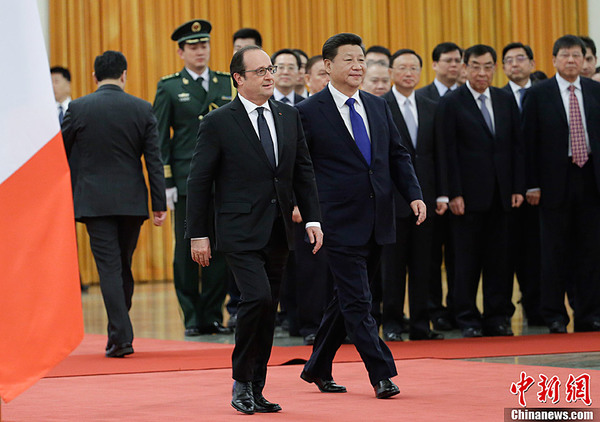China's climate negotiator upbeat about Paris agreement
- By Zhang Lulu
 0 Comment(s)
0 Comment(s) Print
Print E-mail China.org.cn, November 17, 2015
E-mail China.org.cn, November 17, 2015
|
French President François Hollande visited China in early November, leading up to the climate change meeting. [File photo] |
A leading Chinese government official is upbeat about countries striking a legally binding agreement in the upcoming Paris climate change meeting.
Gao Feng, the country's Special Representative for the Climate Change Negotiations of the Ministry of Foreign Affairs, lecturing at Beijing's Tsinghua University, believed an agreement would definitely be secured at the United Nations Climate Change Conference (COP21).
The main goal of the conference, which will be held from Nov. 30 to Dec. 11, is to reach a post-2020 legally binding deal to combat climate change that helps ensure global warming does not exceed two degrees Celsius over pre-industrial levels.
Debates and wrangles have persisted over the burden sharing of emission reductions and climate finance, as developed countries are required by the landmark 1997 Kyoto Protocol to accept greater responsibility for climate change and assist developing countries to combat and adapt to the changes, while the latter contribute to carbon emissions reduction according to their own situations.
Gao acknowledged that great changes had occurred over the past two decades as developing countries are becoming larger emitters and developed countries are less willing to deliver on their promises and have been attempting to undermine or overthrow the principle of "common but differentiated responsibility" regarding climate change.
Despite this, the senior negotiator believed the Paris meeting would be able to reach a universal deal, because it will usher in a "bottom-up" system -- rather than the "top-down"one adopted by the Kyoto meeting -- where countries make their own individual pledges that are thus more practical and more likely to achieve consensus.
He Jiankun, vice chairman of the National Experts Panel on Climate Change, introduced China's Intended Nationally Determined Contributions or INDCs, which was seen as key to secure the success of the climate deal. These targets include reaching carbon dioxide emissions peak by 2030, cutting carbon dioxide emissions per unit of GDP by 60 to 65 percent from the 2005 level by that date, and increasing the share of non-fossil fuels as part of the primary energy consumption to about 20 percent by 2030.
Apart from the submission of the INDCs, China has also announced other climate pledges this year, including a national carbon cap-and-trade system to be launched in 2017 and a 20-billion-yuan (around US$3.1billion) South-South fund to help other developing countries combat and adapt to climate change.
He believed such pledges from one of the world's largest emitters would greatly help the global climate change actions. He also noted that these endeavors are not only China's obligations to tackling climate change but also part of its efforts in transitioning to a green, low-carbon and sustainable economy.







Go to Forum >>0 Comment(s)